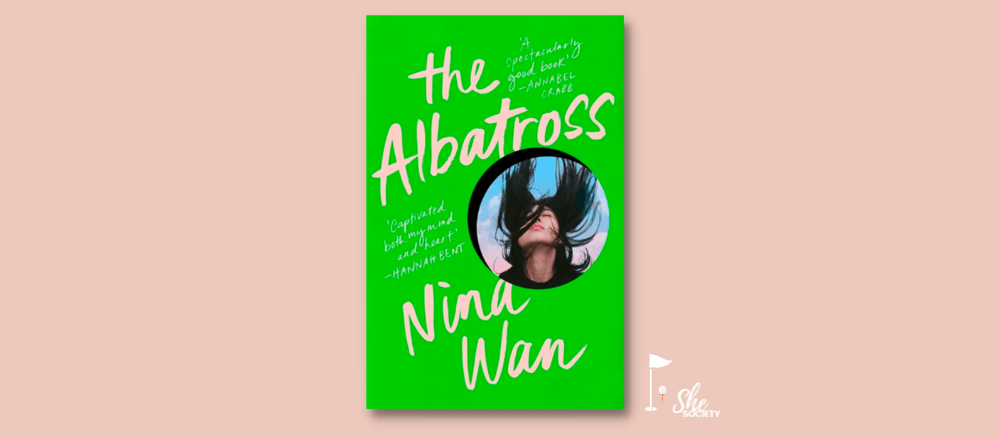
The time-honoured and at-times sublimely meditative game of golf has, like many sports in the modern age, a plethora of life lessons to impart to it’s participants and watchers. Sage viewpoints such as ‘to always keep focused and alert’, ‘do not be distracted by outside interferences’ and ‘enjoy the experience’.
Such veritably spiritual truths are beautifully and causally illuminated in the excellent and very special debut novel, The Albatross, by Chinese Australian (she came to Australia when a child, having been born in Shanghai) stellar author, Nina Wan.
Set in inner-city Melbourne, the book’s flawed and fallible, yet well intentioned and idealistic, heroine is thirty-six year old Chinese Australian (who migrated to Australia as a child), Primrose Li. Primrose has once worked as a driven journalist for the politically left publication, the ‘Criterion’, and is now a stay-at-home wife and mother, married to philosophy lecturer, Adrian, and Mum to the jubilant and energetic Bebe, her six year old daughter.
Times are formidably hard for Primrose and her family. Adrian has been cruelly diagnosed with cancer and is now trying to recover, although his demeanor and psyche have been caustically eroded by the ordeal.
Primrose, also, is saturated by fear and sullied in herself by Adrian’s trials, and is metaphorically lost and wayward. Primrose cleans compulsively and obsessively as a way of coping with life, so much so that she damages her hands.
Salvation for Primrose comes at a time when she most needs it, through her secretive (she keeps it from Adrian) visits to the run-down and seemingly lifeless public golf course known as Whistles. Primrose proves to be ardently dreadful at golf, but is given a glimmer of hope when she meets and starts to play with Harriet, a no-nonsense golfer around eighty. Harriet advises and patiently encourages Primrose to do her best on the golf course, and not give in or give up.
Harriet additionally tactfully advises Primrose to “Never ever look back on a golf course”. These mellifluous words are also apt for Primrose’s own life. She has forever held on to the idyllic memories she has of Peter Loy, her laid-back and thoughtful boyfriend, when Primrose was sixteen and Peter two years older.
As fate would so (inevitably?) have it, Peter (a banker) is now living in Primrose’s street, with his outspoken and ebullient wife, Louisa. The couple socialise with Primrose and Adrian, and even invite them to their opulent coastal house in Flinders, Homer, to stay, with the Loys’ friends who assiduously appreciate, like the Loys, the finer things in life.
Peter and Louisa forthrightly socialise with aspiringly bourgeoisie couples (as they are themselves) ,where wealth and politics are intermingled in conversations and outlooks. Unlike the Li clan, Peter’s family have been in Australia for generations, and have gained considerable wealth and status.
Peter and Louisa are dripping with money, and perhaps this consequential fact galvanises Louisa to always blurt out what she thinks, not heeding the outcome.
On the golf front, Peter belongs to the elite Lost Cove Country Club (and golf club) near Homer, although he took the impressionable Primrose to the humble Whistles golf course when they were an item.
Can Primrose ever let go of Peter and be content with her life with Adrian, or is the temptation to rekindle their teenage romance too great for her and Peter to resist?
Will Primrose ever find the peace in life that she craves? Can she ever get anywhere with her golf game, a sport that seems to consistently defeat her?
Why is Primrose so averse to having Adrian’s brother, Terence, come to stay?
What is the terrible altercation that Primrose’s staid father endures?
Nina has seemingly effortlessly knocked it out of the ballpark with The Albatross, named after a derivatively almost unheard of double golf shot.
Each page in this superlative novel shines with intelligence, wisdom and a deep insight into the human condition (it’s foibles, failings and redeeming features). Themes of race, class, sickness and racial discrimination are held up for we readers to thoughtfully ponder and consider.
Bravo Nina! This is a novel I hope is widely read, not just in Australia but worldwide. The standard that Nina has adhered to is second to none. Despite being a debut novel, The Albatross is as well thought out, structured and character-driven as any masterpiece I can think of that has ever been written.
I loved The Albatross, and can’t wait to read what Nina writes next!
You can purchase the book here!
*As an Amazon Associate we earn from qualifying purchases.


Leave a Reply